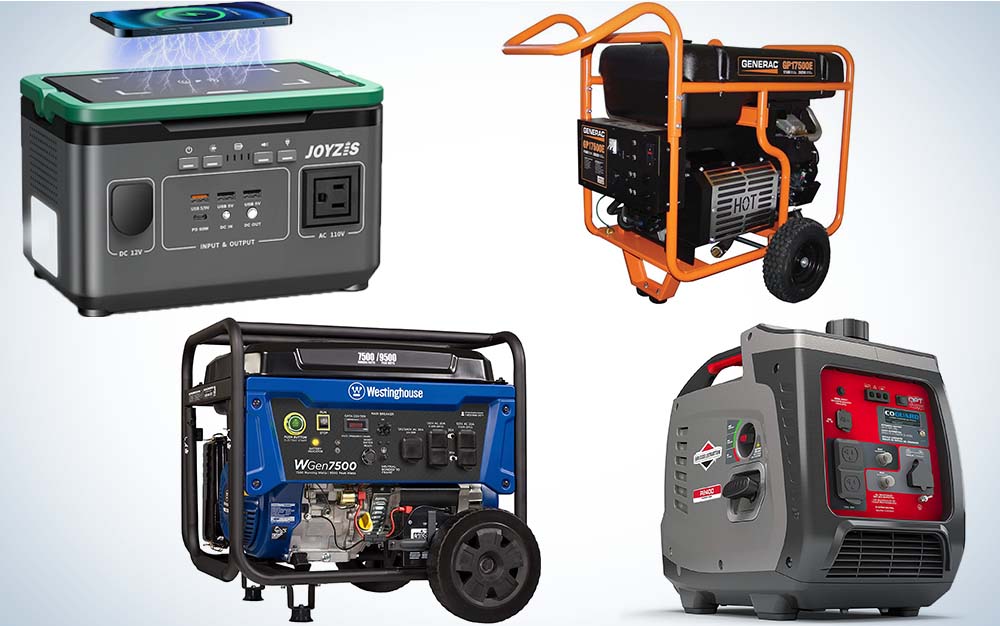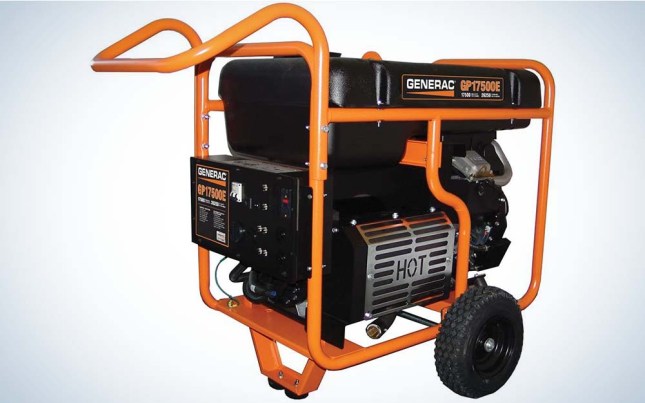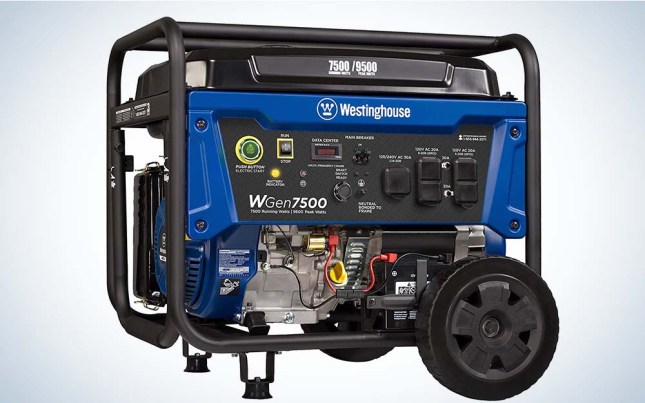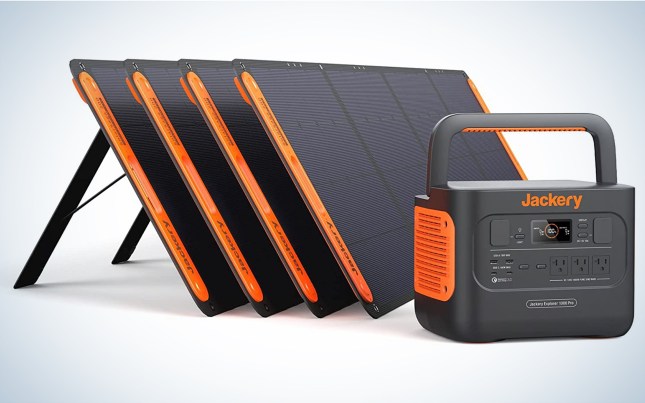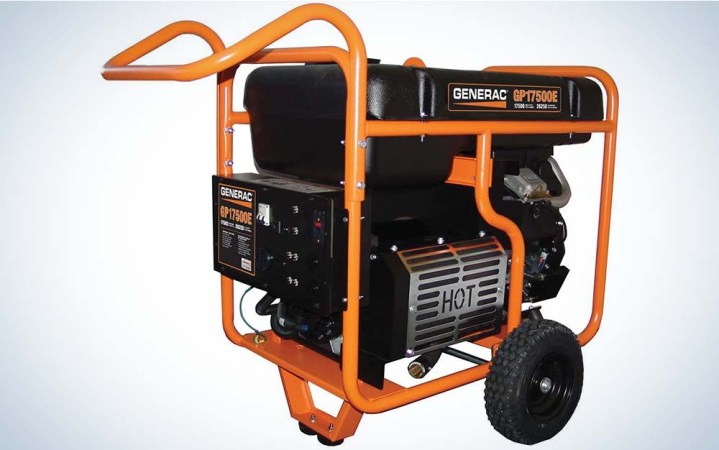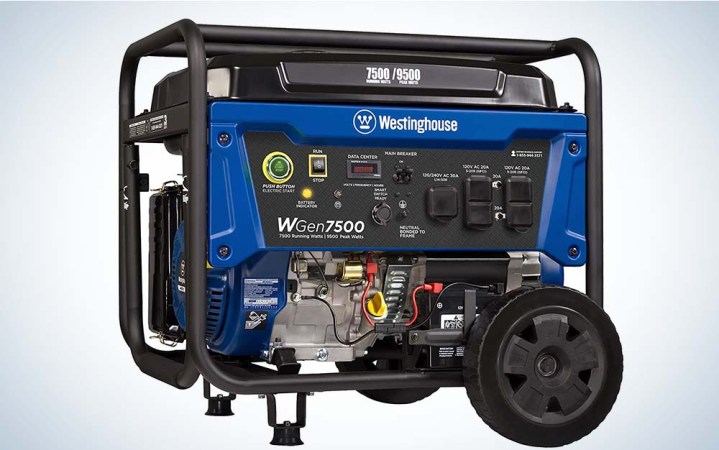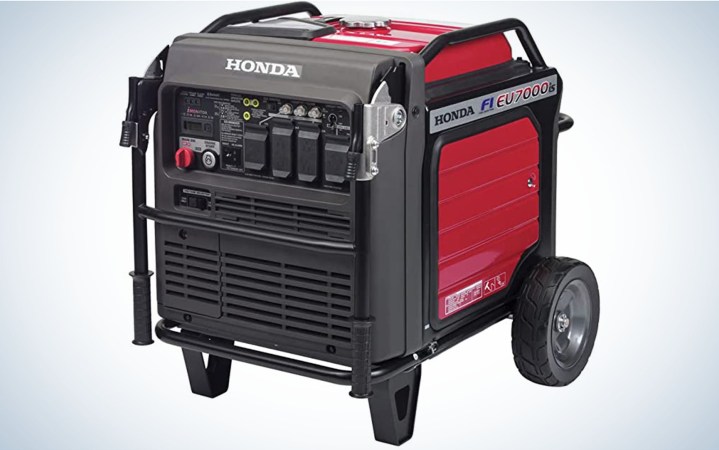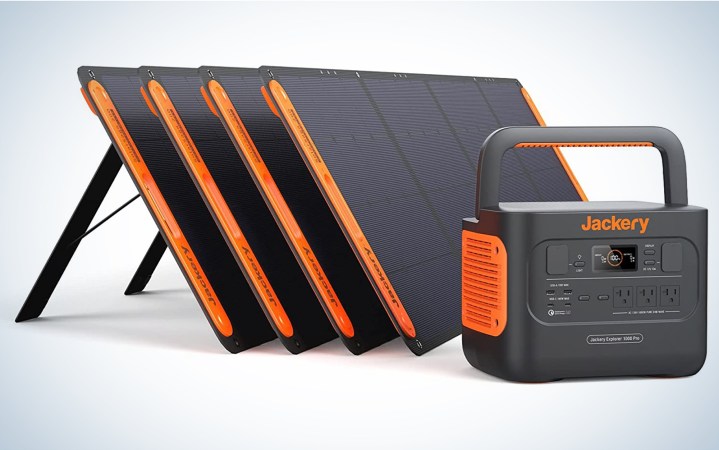We may earn revenue from the products available on this page and participate in affiliate programs. Learn More ›
When you’re in a lurch with no electricity for your home or camp, having a portable generator to get things running is a godsend. These powerful machines are lifesavers after storms knock off electricity, or if you need a boost to run equipment. Ever been at your hunting or fishing camp and need to do some work? Without power, you’re out of luck for running saws, tools, and appliances. With a good portable generator, though, you’ll be able to run tools, refrigerators, and other equipment for as long as you have fuel.
- Best Overall: Generac 5735 GP17500E
- Best for Home Use: Westinghouse WGen7500
- Best Inverter Generator: Honda EU7000is
- Best Solar Generator: Jackery Solar Generator 1000 Pro
A portable generator is an engine running on gas or diesel fuel that creates temporary electrical power. The engine turns a small internal alternator that creates electricity. You can use a portable generator to run large items, such as a refrigerator, furnace or freezer, or smaller ones such as a microwave or television. Giant generators are used in large buildings for backup electricity; these are larger versions of the portable ones used by homeowners and outdoors enthusiasts. The best portable generators, and fuel to run them, often are in demand after natural disasters.
Best Portable Generators: Reviews and Recommendations
Best Portable Generator Overall: Generac 5735 GP17500E
Key Features
- Steel cage design and wheels make it stable and relatively easy to move around
- Offers 17,500 running watts and 26,250 starting watts, more than enough for appliances
- The 16-gallon fuel tank runs for up to 10 hours at 50-percent load
Pros
- Powerful output is more than enough to run several appliances including a fridge and freezer
- Generous fuel tank for peace of mind while you’re handling chores or sleeping
- It has an electric start with the included batter and a plug-in battery charger jack
Cons
- Weighs a hearty 390 pounds (put those wheels — and your legs — to use)
Generac’s 5735 GP17500E portable generator is the best overall portable generator available. The design includes an hour meter, low-oil level shutdown to preserve the engine from damage, and an idle control to save fuel and reduce noise during operation. The OVHI engine is designed to provide full-pressure oil lubrication and the filter helps preserve engine life. This model is designed to power a 5-ton home air conditioner, and other appliances.
Despite the overall weight, this is the unit you plan for and purchase ahead of time. You may want to lock down at your hunting or fishing camp if you’re off the grid yet need power. It probably couldn’t be stolen very easily but creating a space and securing it would be great for when you need it. Maybe the same at home, too. Generac has a strong reputation for tough, dependable equipment. This model provides more than enough power from a portable generator to get the job done.
Best Portable Generator for Home Use: Westinghouse WGen7500
Key Features
- 420cc 4-stroke engine with electric starter
- Generous run time of 11 hours
- Remote start key fob and easy controls to get operational in a hurry
Pros
- Digital readout of run time, voltage, and other critical data while in use
- Supports 30A transfer switch for home use
- Weighs less than 200 pounds and can be moved easily thanks to durable wheels and design
Cons
- Smart switch to help operate home appliances is sold separately
Westinghouse WGen7500, the best portable generator for home use is a compact engine designed to power critical needs. It has a 420cc 4-stroke engine with an air-cooled overhead valve design for more efficient operation. The automatic low-oil shutdown technology protects the engine when low oil level is detected, saving the engine from damage. It also meets EPA and CARB emission standards, which is better for the environment. The push-button key fob starter allows you to get the generator operational from up to 260 feet away.
When you need a durable, efficient portable gas generator but don’t need a monster, this model should be a consideration. It’s well designed with numerous features for home or camp use, and relatively easy to load on a trailer or in a truck bed. The easy digital readout is solid for keeping up with run times, fuel and oil levels, and updates for maintenance.
Best Inverter Generator: Honda EU7000is
Best Overall
Honda EU7000is
Key Features
- 5,500 running watts (7,000 surge watts)
- 263 pounds
Pros
- Extremely reliable and well-built
- Quiet and efficient gas-powered engine
- Compatible with Honda’s My Generator app
- Best for home backup and RV camping
Cons
- Expensive, even for its size
- Heavy
When you need to fire up your generator, the only thing worse than it failing to start is finding out that it can’t produce adequate power. With the Honda EU7000is, you should never have to worry about either of those problems. Honda’s small engines are just as reliable as the brand’s cars, and this home backup generator is strong enough to power multiple appliances or your RV.
The 389cc engine generates 5,500 running watts and 7,000 surge watts. Using fuel injection instead of a carburetor, it can run for 16 hours on the 5.1-gallon tank at a 25 percent load. You’ll be able to power things like a full-size refrigerator, a gas- or oil-burning furnace (yep, those still need electricity), and lights. The EU7000is has wheels, but you’ll still want to keep it on paved surfaces because it weighs 263 pounds.
Aside from the workout of rolling this generator out of the garage and into the driveway, Honda made it very user-friendly. You can start it with the push of a button, control it with an app, and monitor its fuel level with a gauge instead of opening the tank every time. Safety features like circuit breakers, GFCI outlets, automatic carbon monoxide shutoff, and warning lights take the stress out of using this generator.
The EU7000is is a significant investment even before wiring your house for it, and it’s even more expensive than a lot of comparably sized inverter generators. But it’s also built to an incredibly high standard and comes with a bunch of features that make it easy to use. In the long run, you’ll be glad you spent a little extra. If you really want to set yourself up right, buy this for your home or RV and something small like the Jackery Explorer 300 for life on the go.
Best Solar Generator: Jackery Solar Generator 1000 Pro (Explorer 1000 Pro + Solar Saga 200W)
Best Overall
Jackery Solar Generator 1000 Pro (Explorer 1000 Pro + Solar Saga 200W)
Key Features
- Power Station Capacity: 1002 watt-hours
- Solar Panels: Four 200-watt solar panels
- 184 watts generated by one panel in direct sunlight
- Max AC Output: 120 volts and 1000 watts
- Also available with a 2000Wh power station
- Also available with two 80-watt panels
Pros
- Powerful solar panel
- Easy to use
Cons
- Smaller power station than other models I tested
The Power Station
Along with the BioLite BaseCharge 1500 and Anker 555, the Jackery Explorer 1000 Pro had one of the more streamlined user interfaces of anything I’ve tested. There are separate buttons to activate the USB outlets, AC outlets, and DC outlet, along with a button to turn on the power station’s light (in case you want to light up your camp or home) and one to turn on the display. The display here gives you the bare minimum of information—watts in, watts out, percent of the battery remaining, and the time to charge or deplete the battery based on the current conditions.
The Explorer 1000 Pro has an output of 1000 watts (2000 watt peak), which is enough juice to power many modern refrigerators. But given that its battery life is only 1002 watt-hours, it can only supply that power for about a day (assuming it’s not charging anything else) unless it’s also being supplied with fresh juice from a solar panel setup at the same time. For some, this won’t be an issue, as they’ll simply be using the battery to channel power to their other devices during the day while it’s charging, and then using the battery at night to power more low-key items like the best camping fans or maybe one high-energy device like a portable fridge.
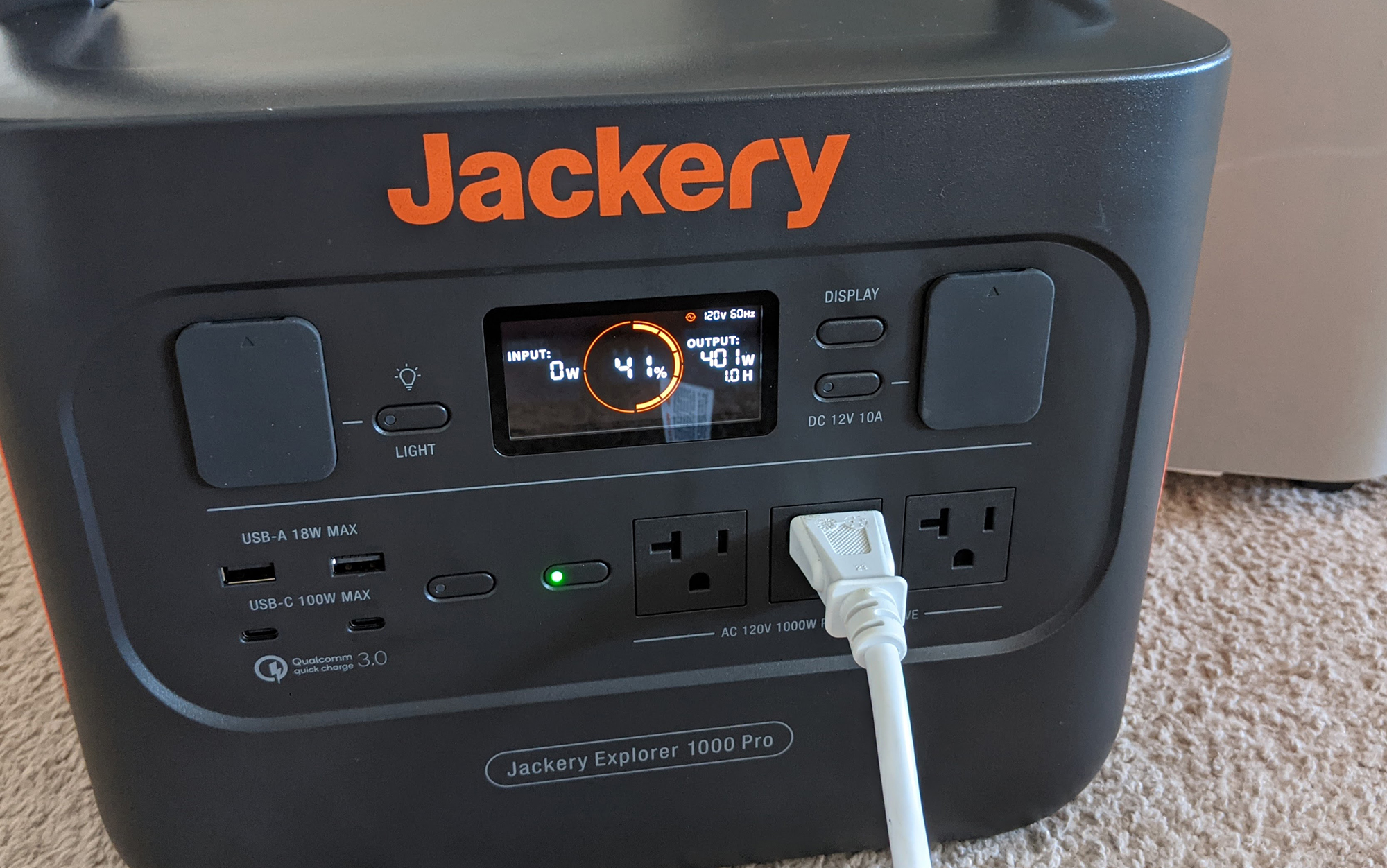
At over 25 pounds, the Jackery Explorer 1000 Pro, is one of the more transportable units I looked at, but it’s still not something that you’d want to lug more than a hundred feet or so at a time. It’s proven to be very capable at holding a charge long-term, even after months of sitting in an unheated garage.
The Solar Panel
I originally tested the SolarSaga 200W solar panel as a full setup, with four panels plugged into a single power station. This test showed the full power of the array, which registered 650 watts of power generation on a sunny (albeit hazy) day. I retested a single panel in tandem with the rest of the units in this review more recently, and under completely clear skies, the panel was even more impressive: It registered 184 watts of energy coming from a single panel. If you don’t have much time to recharge your power station from the sun, then the full setup with all four panels is a no-brainer. (More recent testing of newer panels showed a slight drop in power; however, it is unclear if this is because of natural variation or drop in the product’s efficiency. Either way, this is still a best-in-class panel.)
It is, though, a little complicated. Each panel comes with a carrying case and a cable that connects back to the two DC ports on the Explorer 1000 Pro. If you see a math problem here, that’s correct: You’ll also need two of the Jackery Solar Panel Connectors, which, strangely, are not included in the purchase price. Two of these can be used to double the number of panels you can connect to the Explorer 1000 Pro.
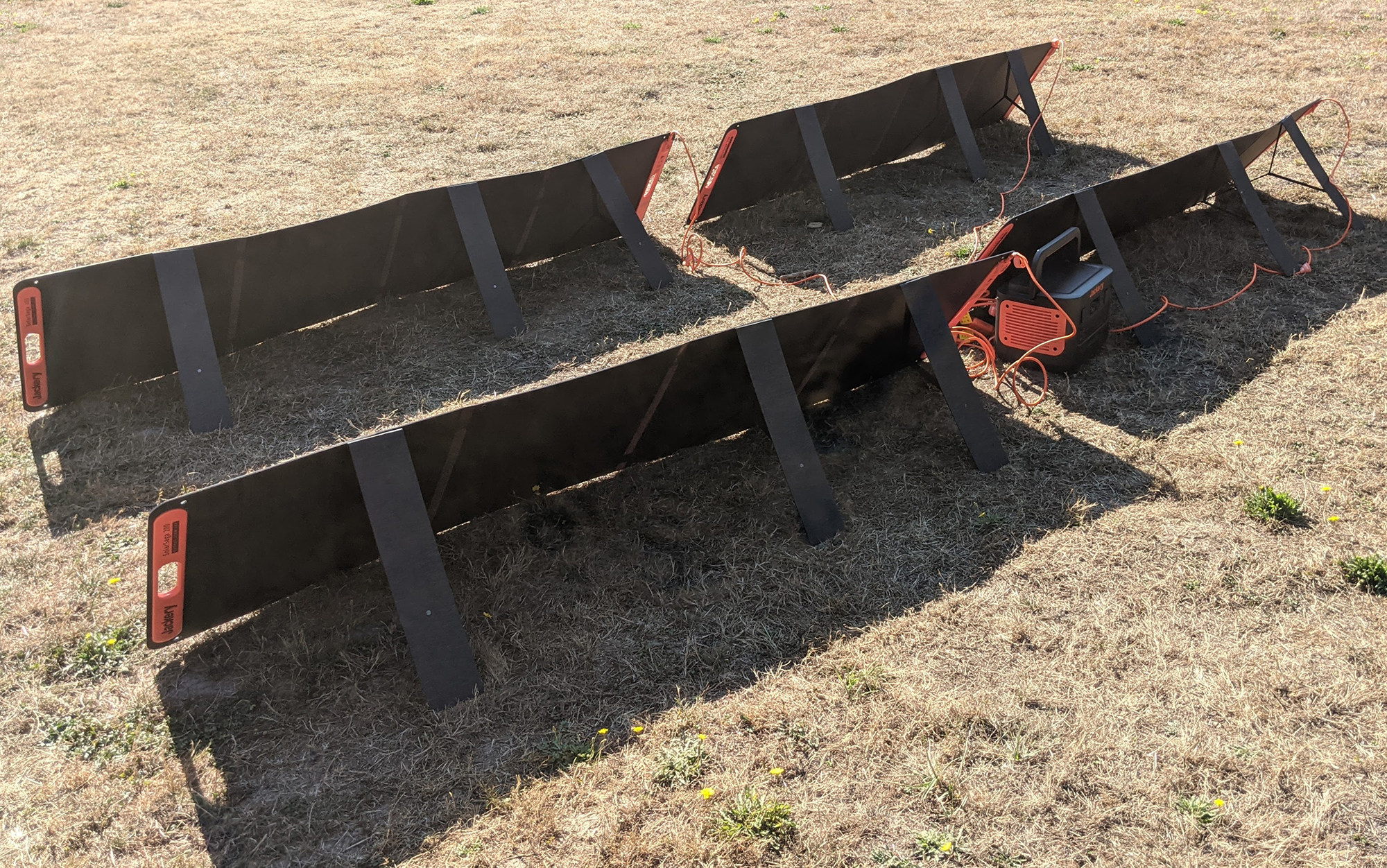
Setting up and taking down this many panels takes some time, but I was impressed by how easy and intuitive it was. That’s because Jackery streamlined the number of ports on each unit, making it that much clearer what cable connects to what unit in what port.
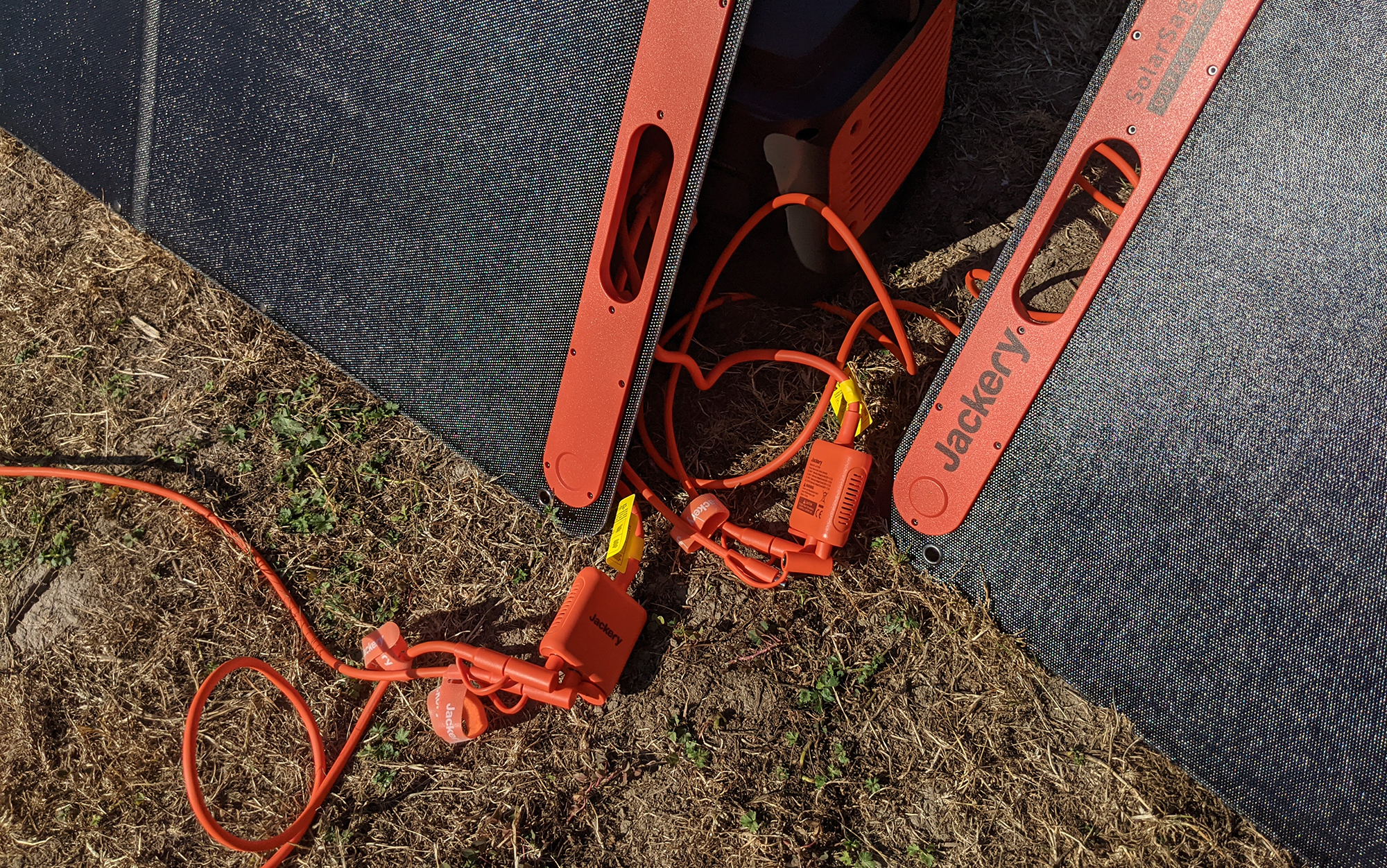
While at first glance there might appear to be a disconnect between the charging time capabilities of this setup and its battery life, it’s worth keeping in mind that conditions are not always optimal. One of the things that impressed me most about these units is the panel’s ability to generate electricity in lowlight conditions. Even in complete shade—dusk fast approaching—a single SolarSaga 200W was generating a 6 watt input.
Read our full Jackery Solar Generator 1000 Pro review for more information.—Laura Lancaster
How to Choose the Best Portable Generator
The best way to choose a portable generator is to consider what you need it for and how much you want to spend. Budget and needs first, right? My needs would be to power at least a fridge or freezer possibly for days in the aftermath of a devastating tornado, based on where we live. My budget? I’d spend whatever I needed to take care of my family in such a situation. Your considerations may be the same. They may be that you need one to restore or build a cabin in the woods. Or you camp frequently but enjoy having lights and a small fridge. When researching portable generators, look for the wattage output, safety features, amount of fuel it holds, weight, and the size of appliances or tools it can safely power.
Solar vs. Fuel Generators
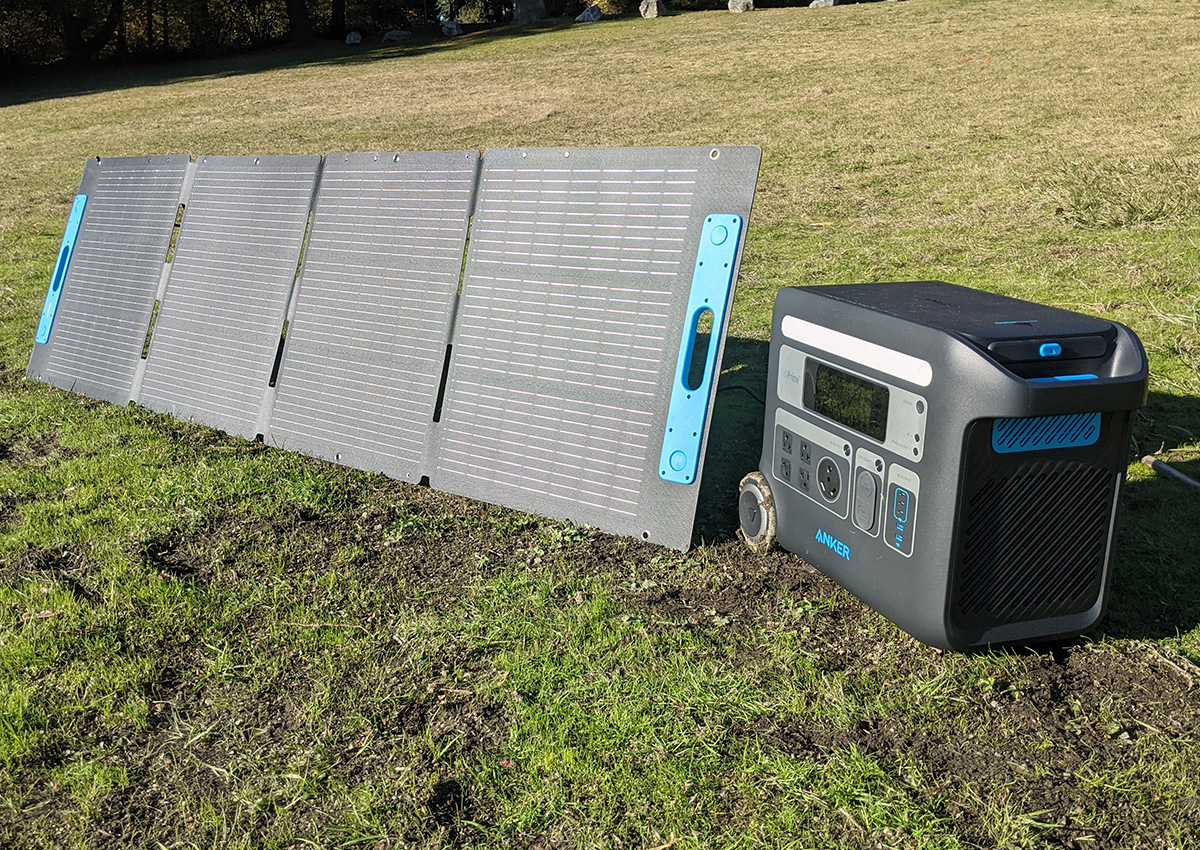
Solar generators are one of the latest innovations and offer some appealing benefits over their fuel counterparts. The solar panel charges a portable power station, which is what you’ll use to power appliances, power tools, or charge your phone. These portable power stations vary in size and power output, so it’s important to match the power station to what you plan to power with it. The negatives of solar generators is that unless your power station is fully charged, you have to wait sometimes an entire day for the sun to power it up. That’s not ideal during a storm.
Fuel generators on the other hand can be used no matter the sun exposure, providing you have fuel. Of course, their downside is that they are loud and produce carbon monoxide—you can’t use them indoors.
If you’re looking for a portable and quiet way to power small appliances, a solar generator is ideal. If you need a lot of reliable power you still can’t beat a fuel generator.
FAQs
Questions you may have when buying a portable generator.
The average lifespan of a portable generator is 10,000 to 25,000 hours, depending on your care of the unit. Given that most portable generators are used only in emergencies or for short periods of time for work chores, a dependable unit should last for years with proper maintenance.
First you must consider what you want or need to power with a generator. Most portable units offer 4,000 to 12,000 watts. Consider that appliances such as refrigerators, freezers or large items like those need 700-800 watts each, but that doesn’t count the startup wattage needed (usually double, or maybe triple). Smaller items such as televisions or a microwave may need just a few hundred watts. A natural gas furnace may need about 1,400 watts to get started. Home air conditioners need considerably more to start and power. Factor in these considerations before purchasing.
Portable generators usually weigh about 50 pounds for lighter models, to a few hundred pounds for larger and more powerful ones — obviously depending on size. Larger, more powerful models often are equipped with wheels for easy transport.
Gas or diesel are the most common fuels used to power portable generators. Models have different size fuel tanks. Run times for the generator to produce power depends on the amount of fuel and design of the engine’s efficiency. In a natural disaster, either planning ahead to purchase fuel or finding it in the aftermath are critical to keep your generator operational.
Methodology
Choosing the best portable generator was challenging, thanks to the wide variety of models available today. I evaluated the available generators based on the following criteria:
- Amount of power (wattage) produced
- Amount of fuel the generator holds
- Total runtime on a full tank of fuel (Full- and half-power runtimes are great to know, too)
- Weight and portability (Does it have wheels? Handles? Could one person move it?)
- Safety features (Does it have a carbon monoxide sensor? Low-oil sensor? Automatic shutoffs?)
The amount of power produced determines what the generator can be used to power. Some models can run a small lamp and charge your phone, while others can run your refrigerator, air conditioning, and other essential appliances.
The amount of fuel your generator holds and it’s runtime will determine how long your generator will run before a refuel. It also impacts the portability of your generator. Other factors for portability include weight, wheels, and handles. If you are using your generator for home use or camping, safety features like carbon monoxide detectors, and automatic shutoff offer peace of mind.
Why Trust Outdoor Life?
Since 1898, OL has been a leading authority in testing and reviewing hunting gear, fishing tackle, guns and shooting equipment, and much more. We have more than a century-long history of evaluating products, and we’re now bringing that expertise to online reviews. Our editors are experienced outdoorsmen and women, and most importantly, we’re trained journalists. We prioritize field testing and objective data when reviewing products. We conduct interviews with gear manufacturers and engineers as well as outdoor experts so that our readers have an understanding of how and why a product works—or doesn’t.
Advertising does not influence our gear reviews and it never will. While we always focus our coverage on standout products—because we want our readers to be aware of the latest and greatest gear—we also cover the flaws and quirks of any given product.
Final Thoughts
Having lived in the Southeast all my life, I’ve seen the aftermath of natural disasters and how portable generators help get people moving again. After a tornado or hurricane, a portable generator can provide hours of electricity for power tools, appliances or even just lights at night for comfort or security. But you have to plan ahead. Finding a portable generator in that situation, not to mention fuel, could be challenging. A good portable generator also is great to have at your hunting or fishing camp if you need electricity to run a cooler or other items. They’re a great investment.
